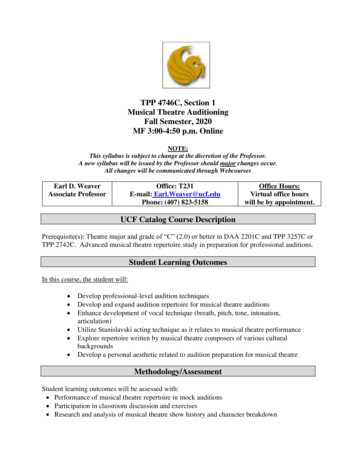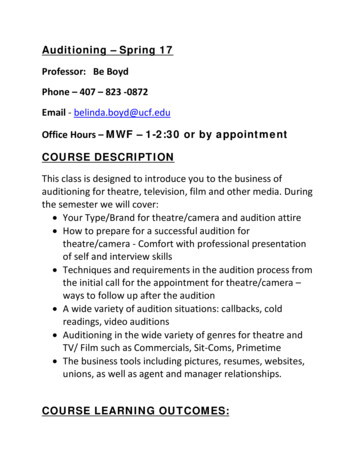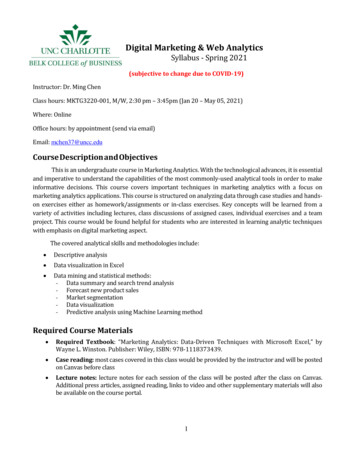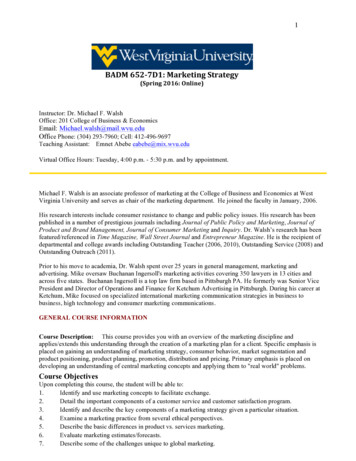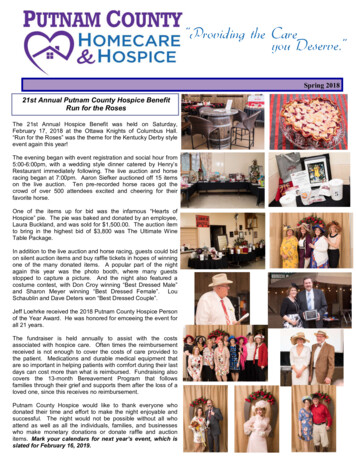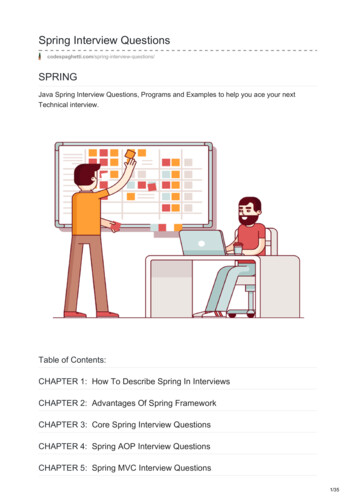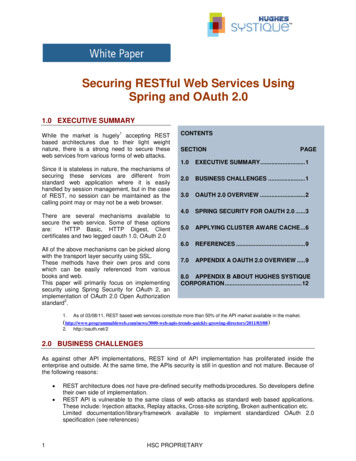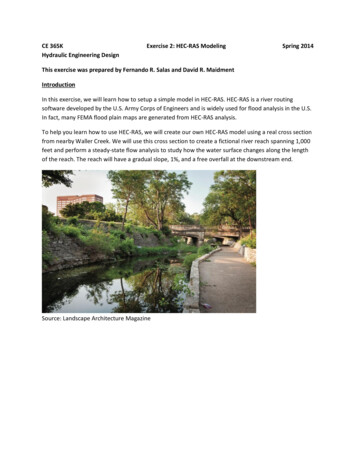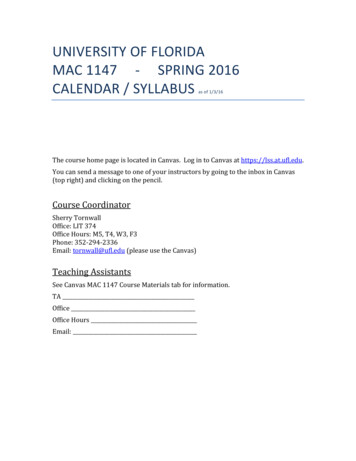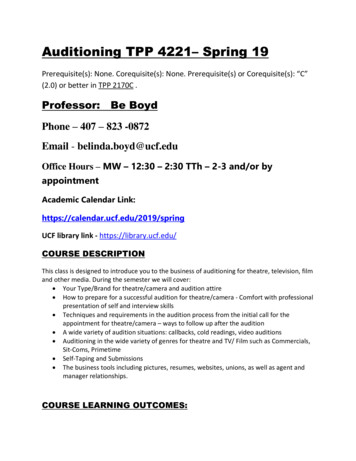
Transcription
Auditioning TPP 4221– Spring 19Prerequisite(s): None. Corequisite(s): None. Prerequisite(s) or Corequisite(s): “C”(2.0) or better in TPP 2170C .Professor:Be BoydPhone – 407 – 823 -0872Email - belinda.boyd@ucf.eduOffice Hours – MW – 12:30 – 2:30 TTh – 2-3 and/or byappointmentAcademic Calendar Link:https://calendar.ucf.edu/2019/springUCF library link - https://library.ucf.edu/COURSE DESCRIPTIONThis class is designed to introduce you to the business of auditioning for theatre, television, filmand other media. During the semester we will cover: Your Type/Brand for theatre/camera and audition attire How to prepare for a successful audition for theatre/camera - Comfort with professionalpresentation of self and interview skills Techniques and requirements in the audition process from the initial call for theappointment for theatre/camera – ways to follow up after the audition A wide variety of audition situations: callbacks, cold readings, video auditions Auditioning in the wide variety of genres for theatre and TV/ Film such as Commercials,Sit-Coms, Primetime Self-Taping and Submissions The business tools including pictures, resumes, websites, unions, as well as agent andmanager relationships.COURSE LEARNING OUTCOMES:
The student will demonstrate confidence, professionalism and a strong audition package in theaudition/interview process.The student will demonstrate an understanding of their character type/brand for the industryThe student will demonstrate an understanding of appropriate audition attire for their charactertype/brand and/or for the audition venue.The student will create a basic websiteThe student will demonstrate a basic understanding of auditioning for commercial work.The student will demonstrate a basic understanding of auditioning for television and film.The student will acquire and provide an INDUSTRY STANDARD headshot and resumeThe student will demonstrate an understanding of self-taping and submittingInstruction / Content Since the business is often tough and unapologetic – you will receive comments on your work from thatperspective. Your look, professional demeanor, non-verbal energy and communications skills are asimportant in this business as your talent- at times you will receive comments about how to adjust yourlook for marketing and brand, sharpening your professional demeanor and communication skills anddeveloping an awareness of your non-verbal energy -purely for the purpose of making you moremarketable. This class is not about process, but about product. The pace will be fast to mirror theexpectations of the business. Your work will be viewed from that perspective. Receive the commentswith professionalism, a collaborative spirit and maturity. Do not take them personally as they are meantto encourage your success in the class and expand your awareness of the business.Course Requirements You must dress in professional/ audition attire each day of the class.When given audition material, you are expected to be prepared and polished on the auditionday.Once we begin camera auditions (please see schedule below) you must bring to class, every day,your own SD card to record each camera exercise. (FYI – it might also be valuable for you tohave a classmate video tape your theatre auditions on your phones as well).MAJOR ASSIGNMENTS*Syllabus may change to accommodate the needs of the class.Mock Auditions –100pts eachYou will have a series of mock auditions. The first audition will occur on the first day of class. Thepurpose of this exercise is to access your current auditioning skills. During the semester you will
audition for each area covered -Theatre (sides and cold readings), Sides for Commercials, TV and FilmRoles. – *Note – for the mock auditions for each area, you will be graded on your audition attire andtools, audition etiquette as well as your performance for the audition.You will be assessed on: Preparation of Assignment/Exercise Demonstration of clear interpretation of content in sides/copy and navigation ofcopy/sides Demonstration of Clarity in Point of View Demonstration of Specificity of style for the audition venue Demonstration of Vocal and Physical Choices Audition Venue Demonstration of growth in technique Audition Attire and LookDaily Exercises/ Assignments for Theatre/ Camera – Uploads ofCamera Work - 100pts each.You will participate in a series of exercises for self-discovery to answer, identify, confirm andpractice the following:For Theatre -What is my theatre type? How is a theatre audition different from a cameraaudition? What is a good theatre audition look? What is the best way to deal with a call back?What should I look for in the script? What is audition etiquette for theatre? Etc. How do I dealwith the audition space?For Camera - Who am I on camera? What is my on-camera presence? What do I need tochange/shift to become camera friendly? Single camera.Once we begin camera work (see schedule below) you must upload your recorded cameraexercises/assignments to our face book page through a youtube account. You will do this everyFriday of every week before 5pm once we begin camera work.Industry Type/Brand - 300pts1. Your type is a combination of the criteria found on any breakdown when a role isbeing cast:o sex, age range, physicality (race, gender, ethnicity, short, tall, thin,stocky, heavy, athletic)
o job title or role in life (i.e young or older parent, teen, grandparent,lawyer, intern, action hero, active type, cop, federal or undercover agent,medical staff, student, criminal, corporate, blue collar, etc),o personality trait (quirky, serious, intellectual, sexy, loud, innocent,bouncy, moody, depressed, mysterious, dangerous, anxious).o Your brand is simply taking these qualities and adding something very uniquelyYOU (your own traits) to the mix. That quality becomes your brand. It might helpyou to get cast more frequently.o The type/brand tells the public what kind of actor they will see in a role. If it’s: Morgan Freeman, you know you are going to see an authoritative,grounded energySandra Bullock, you know that she’ll be tough and charming, possiblyquirkyWatching Robert De Niro, you know the performance will be intense evennow in his comedic work.Viola Davis will demonstrate strength and authority, and vulnerabilityWith Meryl Streep you can expect a performance with close to perfectdialect and emotional depth.With Melissa McCarthy you will get boisterous, over the top comedy.Judi Dench and Helen Mirren are consistently graceful and dignified.Kevin Hart is cowardly, silly but in the end lovable.Denzel Washington is charismatic and sensualo Defining your type/brand does not mean pigeon holing yourself or that yourskills are limited to playing only this type. What is does mean is that as an actoryou have awareness of how you might or can be seen by the industry and you candeliver that in a performance. It gives them something specific. Your branddoesn’t limit you – it gets your foot in the door and gives the industry somethingspecific to grab onto when they see you.On, Jan 15 you will bring in at least 3 pictures of famous actors whose category or typeyou can realistically fit into. (Find pictures that are big enough for us to see the featuresof the actors you choose). Look to actors you resemble (Brad Pitt was compared to ayoung Robert Redford when he first started) or actors whose energy is similar to yours(is your natural energy edgy and sexy like Viola Davis, intense like Christian Bale,sensual like Angelina Jolie, naturally nerdy like Jesse Eisenberg, peppy like Anna Faris,the clown like Chris Pratt, artsy like Jill Scott, or quietly confident/trustworthy like TomHanks?Once you have done this, we will begin to talk about a look that helps you achieve thelook that moves you more toward your marketable or commercial type for the industry.You will receive feedback on your audition attire the first day of class. Dress parades will
be incorporated into the mock auditions for you to demonstrate your understanding ofyour type and the audition attire for that particular audition venue.You will receive an overall grade for your Audition Attire and Physical Achievementtoward type (including the material you choose for auditions) for the semester.Website –300ptsYou will build a website to increase your media presence. Due April 4– email the websiteaddress by 5pm. There are a number of free website builder starter programs out there, themajority are ones that require a fee to maintain after the initial presence. Wix, Solutions,Mixform, others listed below. Your website should include:o an introductory page or home page that has something that describes you as aperson or artisto photos, resume, bioo on-camera clips, current projectso possibly a blog. On your blog, you can talk about your life, what you love, whatinspires you, etc.o All of your postings should relate to the business in some way. You will be givingyour agent/prospective agent the tools they need to represent you properly. Here are some samples of websites from former students:oooooooChristopher Bencomo - https://christopherbencomo.com/Isabella DeChard - rd/aboutSalavatore Vieria - ance Jackson - http://www.terrance-jackson.com/about/Courtney Grile - http://www.courtneyhelengrile.com/Nick Saldivar - http://nick-saldivar.com/Quentin Darrington - sumes – 300ptsYou must have a quality, industry standard headshot and a resume. You will also need tosecure a professional photographer and schedule a headshot session. Please bring in yourcurrent headshot and resume for the first mock audition.o Samples of business quality headshots – Krista Knowles – Look under talent and then headshots
0789/headshots Inge Uys – Sample of the same actress with different lookshttp://resumes.actorsaccess.com/ingeuys On Jan 29 please email your appointment time and photographer’s info for your headshot session. The first draft of your resume and the website or link to your headshots isdue on March 5 You should email resume and upload pictures from your website to email. The finalcopy of your Headshot and Resume due April 9. Assignments are late if they are notreceived by 5pm on due date.Showcase Audition and Final April 25 – 10am 12:50pm– 300ptsOn Finals Day, we will have invited agent/s to see your final audition. On March 28 or April 2, we willbegin in class work on your showcase audition – your pieces should be chosen before this date. Whenwe begin in class work on your showcase pieces, you will dress for the appropriate audition and presentthe appropriate audition piece/s. You will also bring your final head shot/s and resume to theShowcase. Showcase and Final - .*Please note that this date or time might need to change in order toaccommodate the agent/s schedule.)DAILY SCHEDULE*For due dates for Major Assignments -Please refer to the Major Assignment SectionJan 8/10 Syllabus/Tues and Thurs - Mock Audition and Feedback- Reading:Jan 15/17 Tues Bring in pictures of your type/ How to Approach ColdReadings for Theatre –Overview – Thur Begin Cold ReadingsJan 22/24Cold Readings for Theatre – You and a ReaderJan 29/ 31 Appointment time and photographer’s info for your head shot session.Feb 5/7websiteACTF – Assignments TBA– prep commercial auditions, work onFeb 12 -/14Commercial Auditions
Feb 19/21Finish Commercial Auditions/ InterviewsFeb 26/Feb 28 Interviews/ Discuss Voice Over, time in the schedule permits/Mar 5 - 7TBA/ The first draft of your resume and the website or link toyour headshots is dueMar 11 -15Spring Break – Yippppeee!!!Mar 19/21Auditioning for TV and FilmMar 26/28Auditioning for TV and Film/ Work on Showcase AuditionApril 2/4Work on Showcase Audition – Website DueApril 9/ 11Work on Showcase – Final Headshot and resume dueApril 16/18Work on ShowcaseApril 23 – Study DayFinal Thurday April 25 - Showcase With Agents -10am 12:50pmHandout for Auditioning ClassThere is an auditioning handout attached to this email. It contains useful information about thebusiness (advice from casting directors, information on brand/type). You are responsible forknowing the material on any handouts you receive for the class as well as in class material.CLASS ROOM CONDUCT AND GRADING If you miss class, you must make up the work assigned for the day youmissed and you must be prepared to participate fully in class exercises orperformances upon the day of your return. If you are absent during a group performance or presentation, you will not be allowed to
make up this assignment, unless you have a certified excused absence. In this case, theother members of the group will be given an amended list of guidelines for completingthe project without you. Your first unexcused absence will lower your final grade five points, your secondunexcused absence will lower your grade 10 points (which will lower it a full letter), andyour third unexcused absence will result in a failure of the course. Participating in a show is not a valid excuse for missing class or lack of preparation foran assignment. Cell phone use – please put away cell phones during class. Cell phones should not beused for taking notes or reading scripts. Please have a small notebook that allows you towrite and take notes and have a hard copy of your materials, scripts, texts, etc.ONLY THE FOLLOWING ARE CONSIDERED EXCUSED ABSENCES: university sponsored and excused events serious illness that is documented by a doctor’s note death or serious illness in the immediate family – please be aware you may be asked toprovide documentation Or see excused absences under UCF Core statements.Attendance Acting training is a progressive process. Do not miss class. Acting training is aboutchanging your technique and approach to acting. Every class is a valuable steptoward altering your process. Punctual attendance for class - as for rehearsal calls - is mandatory. Repeated neglectof this will result in a lowering of the final grade. You will be given a dailyattendance and participation grade. (Participation is defined as daily in class exercisesand assignments and/or daily constructive, professional feedback for your classmatesthat is based on techniques in class.)Instruction / Content
Acting requires the use of mind, voice, and body, therefore there will be situationsrequiring a certain amount of physical contact between you and the instructor and theother students. You will work with the instructor and your partner/s to develop physicalityand/or physical contact that is comfortable for all parties involved and matches the givencircumstances of the script.The class will include screenplays and materials which may express adult or controversialthemes as well as strong language.You must inform the instructor during the first week of class if you have any physicalchallenges or otherwise that might impede your full participation and development of inclass work. No need to go into details, just basic information to help the instructorunderstand your parameters and to set you up for success in the class.It is imperative that we treat each other with respect in the class. Respect includes:feedback that is constructive, a working relationship that is collaborative and anenvironment that promotes professionalism and focus on everyone’s success. If youhave a communication challenge with a colleague or colleagues in the class, pleasediscuss the challenge with your professor. Remember, the ultimate goal is classroomsuccess, respect and collaboration.GradingAll work will be based on a 100pt grading scale (See specific points for each assignment).Your overall grade for the class will be based on the accumulation of points for thefollowing areas: Major Assignments (see weekly schedule)Possible QuizzesParticipation in daily assignments and exercisesAssignment deadlines and punctualityWillingness and Consistency when rehearsing with partners outside of the scheduledclass time Professionalism (including attitude toward criticism, and respect for fellowclassmatesGrading Scale95 – 100 /A94 – 90 / A89 - 87 / B 86 – 84/ B83 – 80/ B79 – 77/ C 76 - 74/ C73 – 70/ C-69 - 67/ D 66 - 64/ D63 - 60/ DBelow 60/ F
Academic IntegrityStudents should familiarize themselves with UCF’s Rules of Conduct at http://osc.sdes.ucf.edu/process/roc . According to Section 1, “Academic Misconduct,” studentsare prohibited from engaging in1. Unauthorized assistance: Using or attempting to use unauthorized materials, information or studyaids in any academic exercise unless specifically authorized by the instructor of record. Theunauthorized possession of examination or course-related material also constitutes cheating.2. Communication to another through written, visual, electronic, or oral means: The presentation ofmaterial which has not been studied or learned, but rather was obtained through someone else’sefforts and used as part of an examination, course assignment, or project.3. Commercial Use of Academic Material: Selling of course material to another person, student,and/or uploading course material to a third-party vendor without authorization or without theexpress written permission of the university and the instructor. Course materials include but arenot limited to class notes, Instructor’s PowerPoints, course syllabi, tests, quizzes, labs,instruction sheets, homework, study guides, handouts, etc.4. Falsifying or misrepresenting the student’s own academic work.5. Plagiarism: Using or appropriating another’s work without any indication of the source, therebyattempting to convey the impression that such work is the student’s own.6. Multiple Submissions: Submitting the same academic work for credit more than once without theexpress written permission of the instructor.7. Helping another violate academic behavior standards.For more information about Academic Integrity, consult the International Center for AcademicIntegrity http://academicintegrity.org .For more information about plagiarism and misuse of sources, see “Defining and AvoidingPlagiarism: The WPA Statement on Best Practices” http://wpacouncil.org/node/9 .Responses to Academic Dishonesty, Plagiarism, or CheatingStudents should also familiarize themselves with the procedures for academic misconduct inUCF’s student handbook, The Golden Rule http://goldenrule.sdes.ucf.edu/docs/goldenrule.pdf .UCF faculty members have a responsibility for students’ education and the value of a UCFdegree, and so seek to prevent unethical behavior and when necessary respond to academicmisconduct. Penalties can include a failing grade in an assignment or in the course, suspension or
expulsion from the university, and/or a “Z Designation” on a student’s official transcriptindicating academic dishonesty, where the final grade for this course will be preceded by the letterZ. For more information about the Z Designation, see http://goldenrule.sdes.ucf.edu/zgrade .Course Accessibility StatementThe University of Central Florida is committed to providing access and inclusion for all personswith disabilities. Students with disabilities who need disability-related access in this course shouldcontact the professor as soon as possible. Students should also connect with Student AccessibilityServices (SAS) http://sas.sdes.ucf.edu/ (Ferrell Commons 185, sas@ucf.edu, phone 407-8232371). Through Student Accessibility Services, a Course Accessibility Letter may be created andsent to professors, which informs faculty of potential access and accommodations that might bereasonable. Determining reasonable access and accommodations requires consideration of thecourse design, course learning objectives and the individual academic and course barriersexperienced by the student.Campus Safety StatementEmergencies on campus are rare, but if one should arise during class,
UCF library link - https://library.ucf.edu/ COURSE DESCRIPTION This class is designed to introduce you to the business of a
